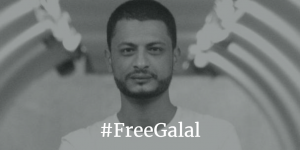A Letter from Tora Prison
Opening:
You, something
in the heart, unspoken,
something
in the throat, the last wish
of a man on the gallows
when the hour of hanging comes,
the great need
for oblivion; you, prison
and death, free of charge;
you, the truest meaning of man,
the word “no”—
I kiss your hand
and, preparing for the trial,
put on a suit and pray
for your Eid to come.
I’m the one
who escaped from the Mamluks,
I’m the child
whose father’s name is Zahran,
and I swim in your name, addiction.
I’m the companion of outlawed poets.
O my oblivion, I’m the clay
that precedes the law of concrete.
In the heart of this night
I own nothing
but my smile.
I take my country in my arms
and talk to her
about all the prisoners’ lives… out there
beyond the prison’s borders,
beyond the jailer’s grasp,
and about man’s need… for his fellow man,
about a dream
that was licit
and possible,
about a burden
that could be borne
if everyone took part in it.
I laugh at a song
they call “criminal,”
which provoked them
to erect a hundred barricades.
On our account, they block out the sun
and the thoughts in the head.
They want to hide the past
behind locks and bolts,
preventing him from whispering
about how things once were.
They want to hide him
by appointing guards—
weak-minded foreigners
estranged from the people.
But what wonder is this?
His fate is written
in all the prison cells.
His cell has neither bricks
nor steel,
and he was not defeated
within it.
Outside… a squadron of slaves.
Inside… a crucified messiah.
The thorns above his brow
are witnesses: You betrayed his revolution
with your own hands.
With shame in your eyes, you
are the Judases of the past,
whatever your religion, whatever
miniscule vision you have.
We’ve come back
and we see you.
You who imprisoned
the light, that naked groaning.
The light doesn’t care
how tall the fence is;
it’s not hemmed in
by steel bars
or officers’ uniforms.
It cannot be forgotten.
You can take a public square away from us,
but there are thousands and thousands of others,
and I’ll be there, waiting for you.
Our land will not betray us.
With each olive branch
we’re weaving your shrouds.
And the young man you killed
has come back, awake now
and angry.
He’s got a bone to pick
with his killer.
He’s got a bone to pick
with the one who betrayed him,
the one who, on that night of hope,
acquiesced, fell silent, and slept.
His wound has healed; he’s come back,
a knight
without a bridle;
he’s setting up the trial
while an imam prays among us
and illumines the one who was blind;
he’s rolling up his sleeves, preparing
for a fight;
he was killed—yes, it’s true—and yet
he has his role in this epic;
he stands there now
and holds his ground.
We’ve returned
to call on God
and proclaim it: “We’ve come back,
come back
hand in hand.”
Again we proclaim it: “We’ve come back,
and we vow
to spread the light,
the new dawn,
the keen-sighted conscience.”
We’ve come back, and we can smell
the fear in in your veins;
and our cheers tonight
are the sweetest of all:
“We are not afraid.
We are not afraid.”
We saw a country
rise from sleep
to trample a pharaoh
and cleanse the age
of the cane and cudgel.
We saw a country sing:
those were no slave songs,
no harbingers of doom, rather
songs fitting
for a new kind of steel.
We saw it.
We saw a country
where no one is oppressed.
Galal El-Behairy, the Tora Prison, Cairo, May 2018
Translated from Egyptian Colloquial Arabic. Due to the potential for political repercussions against himself and his family, the translator of this poem has chosen to remain anonymous.
